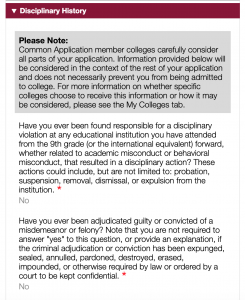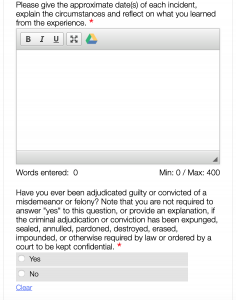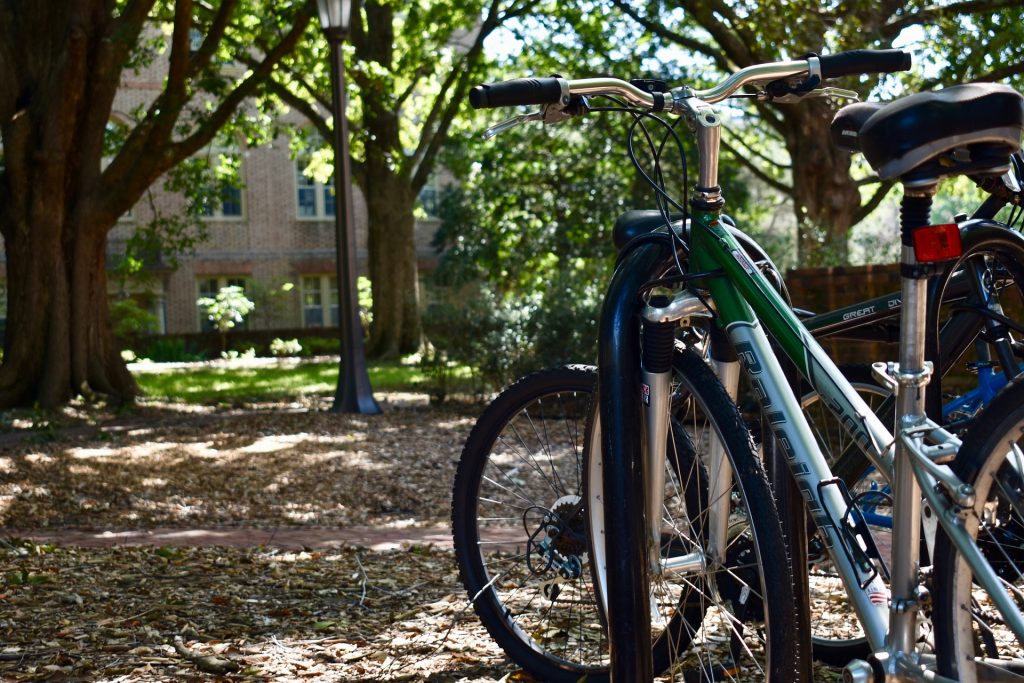
Parents and other primary caregivers shape their children’s moral development in myriad ways. They also often influence every phase of the college preparation, search, and admissions process.
In the following seven guideposts, Making Caring Common explores specifically how parents can guide their teens ethically, reduce excessive achievement pressure, and promote key ethical, social, and emotional capacities in teens in the college admissions process.
1. Keep the focus on your teen
Why? The college admissions process, a key rite of passage in adolescence, can be a wonderful opportunity for parents to get to know their teen in a deeper way—to understand what they are drawn to, hope for, fret about, and value in others and themselves. It is also a vital opportunity for parents to express and model the empathy in their relationship with their teen that supports their teen’s authenticity and is so crucial for teens to develop in their relationships.
Yet our hopes, anxieties, and needs in this process can cause us to misunderstand or subordinate our teen’s needs. We may, for example, tacitly pressure our teen to attend a college to live out our dreams, compensate for our shortcomings, or reproduce our own college experience. When parents compete with other parents or view their teen’s college choice as a public marker of their success as parents, they can both sideline their teens’ needs and flood their teen with fears of shaming them if their college options don’t broadcast success. “The most helpful change that parents and colleges could make in the admissions process,” a high school student told interviewers at the Education Conservancy, is to send the message that “you’re a perfectly good person—maybe even a better person—if you don’t go to one of the top ten colleges.”
During the college admissions process, parents also face their teen’s impending separation from them. The admissions process is often a rite of passage for teens and for parents, a time when parents’ role and center of gravity shifts in ways that can shake loose feelings that can undermine parents’ ability to act in their teens’ best interests. Some parents may cling to their teens more tightly than they should, anxiously asserting what remains of their control of their teens’ life and hampering their teens’ ability to think independently—the infamous “helicopter,” “bulldozer,” or “lawnmower” parents. Other parents, eager for their teen to move on, may prematurely back away.
How? It’s important for parents to undertake the often subtle, difficult work of disentangling their wishes from their teen’s wishes. Because we all have our blind spots, parents can often benefit a great deal from talking to those they respect and trust about the places where their own and their child’s views about colleges conflict, and about how to handle these conflicts.
Parents, too, can be alert to moments when they may be conflating their interests with their teen’s. It should be a red flag for us as parents if we find ourselves peppering admissions staff on college tours while our teen stands idly by, constantly assessing what our teen’s course and activity choices mean for their college applications, find ourselves consumed with poring over commercial college rankings, or feel our self-esteem plummet if a child is rejected at a particular college.
At the outset of the process, parents might ask their teen questions that enable them to better engage in the complex choreography of following and guiding their teen. In the whipped-up, frenzied atmosphere of the college admissions process, parents often need to pause and listen. We might ask our teens whether they feel stress in this process and what is causing it. We might ask whether the process is causing them to compromise their values or making them feel less like themselves, and we might invite feedback on our role: “What role would you like me to play in this process?” “Will you tell me if I’m involved in ways that are making this process harder for you?”
2. Follow your ethical GPS
Why? The college admissions process often tests both parents’ and teens’ ethical character. A small fraction of parents engage in outright unethical practices to give their children advantages: getting psychiatrists to falsely diagnose their teen as having learning differences so their child is granted more time on standardized tests, threatening to sue guidance counselors who write poor recommendations, buying college essays online, or writing anonymous letters to admissions offices that seek to sabotage the admissions chances of other students at their teen’s school. Far more commonly, parents may slip into more subtle forms of dishonesty—allowing their own thinking or voice to intrude in college essays, for example, or looking the other way when hired tutors are over-involved in applications, a trend that appears to be growing (Jaschik, 2017). There’s good reason to believe that many teens lie or at least exaggerate on their college applications, and parents may also either condone or half-consciously overlook these violations. According to several studies, a whopping 80 – 95% of high school students report some form of cheating in the last year, and many of these students view cheating as trivial or don’t see it as a problem at all (Challenge Success, 2012; O’Rourke, Barnes, Deaton, Fulks, Ryan & Rettinger, 2010; Wangaard & Stephens, 2011). In a survey by the Josephson Institute of Ethics (2012), 57% of high-schoolers agreed that, “in the real world, successful people do what they have to do to win, even if others consider it cheating.” Some parents also give their children advantages without any consideration of equity or fairness in the college admissions process, such as paying private college counselors $40,000 a year (Berfield & Tergesen, 2007)—practices that also constantly fuel other parents’ anxiety that they are short-changing their own child. Some parents discourage their teen from sharing information and resources with their peers, fearing that their teens might end up competing with those peers for the same colleges.
There are many compelling reasons why parents shouldn’t let adults’ thinking and voices seep into college applications or allow teens to misrepresent themselves in other ways. Allowing these misrepresentations sends the message that ethical standards can be ignored if they’re inconvenient and that success doesn’t need to be earned. Adolescence is also a time when teens are both developing strong moral convictions and high ideals and are prone to deep cynicism. They can be razor-sharp alert to hypocrisy and often long for adults who are North Stars, who they can deeply respect and trust (Coles, 1986; Erikson,1968). When parents allow teens to misrepresent themselves, and especially when parents actively participate in that misrepresentation, they can stoke that cynicism and erode that trust. “I know kids,” says Denise Pope from Challenge Success at Stanford University, “who are absolutely mortified when their parents cheat the system. They’re embarrassed and ashamed” (Miller, 2013). Letting teens misrepresent themselves can also send the message to teens that there is something wrong with them: Why else, teens might ask themselves, would my parents write my essay or allow me to misrepresent myself? (Miller, 2013). Misrepresentations can be self-defeating in another sense: They can land teens in the wrong college. When parents or teens try to justify misrepresentations by claiming that “everyone is doing it” or “the system is corrupt,” they also create a very slippery ethical slope that can simply reinforce teens’ conformist tendencies and deprive them of a key lesson in moral leadership— that morality often means going against the herd.
How? Rather than dismissing misrepresentations as trivial or finding ways to overlook them, we as parents ought to be willing to ask ourselves hard, fundamental questions about who we want to be and what we want to model for our children. We can consider whether getting into a particular college is really more important than compromising our teen’s or our own integrity. We can consider with our teens the exceptional cases when dishonesty is warranted in the service of a higher principle—when it means, for example, protecting someone’s life or advancing a vital cause—and discuss whether misrepresenting oneself to get into a college one prefers really qualifies as one of these cases. We can remind ourselves and talk to teens about why authenticity and honesty are critical—especially in this era of “fake news”—and about the necessity of acting in ways that we want to be precedents for others. Just as important, we can explore with teens why they might feel pressured to cheat or misrepresent themselves—do they fear disappointing or shaming themselves or us?—and think through with teens what role we might play in alleviating that pressure.
3. Use the admissions process as an opportunity for ethical education
Why? Far too often, the college admissions process is eye-opening for young people in all the wrong ways. It’s a powerful introduction to the values of adult society, and many young people are morally troubled, sometimes deeply so, by what they experience. Many students across a wide range of communities are acutely aware that the deck is stacked, that there are vast differences in students’ access to counselors, tutors, and other admissions resources, and that college is simply unaffordable for staggering numbers of families. Many students bridle at the unfairness of favoring certain students in admissions, such as donor and legacy students, full pay students, and athletes. Many also struggle with how much they can embellish their applications and “play the game” without compromising their own authenticity and integrity.
How? It’s clearly critical to create greater equity and fairness in the college admissions system. Talking about these ethical concerns is not a substitute for that. But these types of ethical questions and concerns provide powerful opportunities for helping students take multiple perspectives and develop more mature ethical understandings. Parents can engage their teens in thinking about why well-intentioned people create and participate in unfair systems and to consider the crucial question of how one participates ethically in systems that one may view as unethical in significant respects. Is it ever ok to cheat in a system that one views as cheating you? Parents and teens might explore the many inequities in this process. Why do they exist? What might be done to remedy them? How can one effect change? They might analyze from various vantage points—including from the perspective of college admissions staff or financial aid officers—the case for and against favoring athletes and children of donors and legacies. Students might be asked to imagine an admissions process that they view as fair and high-integrity and to consider who and what needs to change for this system to exist. All of these conversations, of course, need to be guided by key ethical principles, for example, honesty and fairness are important to strive for in all our interactions and honesty should only be compromised when it is outweighed by other ethical considerations, such as protecting others or oneself from serious harm. Parents might also speak directly with students about the reality that there is in, in fact, a certain “game to be played” in this process, but discuss with students both how to play this game—presenting themselves in ways that are likely to be attractive to college admissions offices—while also presenting themselves authentically. It’s a difficult skill that they are likely to need in various settings throughout life.
4. Be authentic
Why? Many parents fail to have authentic, honest conversations with their teens during the college admissions process, diminishing their role as trusted guides and mentors and eroding their capacity to support their teen in expressing themselves authentically. We have talked to many young people in middle- and upper-class communities who report that their parents, for example, say that getting into a highly selective college doesn’t matter in one sentence but then badger them about grades or SAT prep in the next. One parent we spoke to told us without a hint of irony: “My husband doesn’t care whether our daughter goes to a high-status college. It’s fine with him if she goes to Swarthmore (a highly competitive and high-status school).” Other students report that their parents play down high-status colleges only because at some level their parents know that they live in a neighborhood and attend schools that will do the muscling for them. “My parents don’t have to say anything about how important it is [that I go to a high-status college] and I’m still going to feel a lot of pressure in my community to go to one of those places,” a 17-year-old from a town outside Boston says. “The only reason they can tell themselves they’re not pressuring me is that there’s already huge pressure on me.” Still other students view their parents as showing their hand when they protest too loudly about other parents’ intense focus on selective colleges. As one high school student wrote in U.S. News and World Report: “My mom delights in anecdotes about the ridiculous activities of ‘psycho moms,’ her name for mothers who are overly anxious about where their children will attend college. This is how she assures herself that she is not as crackers as these women” (Karlin, 2005). Some parents themselves are aware of their hypocrisy: “We tell our children one day that we just want them to go to a college where they’ll be happy,” a Boston parent tells us, “and the next day we tell them they should go to the best college they can get in to.”
How? As parents, many of us need to reckon with these conflicting feelings and talk to others both about these feelings and about how to discuss them authentically with our teen. We also can try to understand what’s “in the water,” scanning the many school and community factors that may be influencing our teen’s college considerations so that we can talk to our teens in ways that acknowledge these realities. In addition, we can simply ask our teen to alert us if they think we’re sending mixed messages.
Finally, many parents may underestimate what a relief it would be to their teen and the extent to which it would support their teen’s maturity and secure their respect if they stopped dodging and spoke honestly, including at times sharing their own irrational feelings. For example, while it’s important for parents to try to manage their disappointment when their teen is rejected at a college, if parents are visibly disappointed in the presence of their teen, it might help teens a great deal if parents explained why. A parent might explain that they always wanted to attend that college or that they were too caught up in the status of that college and that they recognize that these are their issues to work out.
*Stay in the know! Subscribe for news, tips, and advice*











